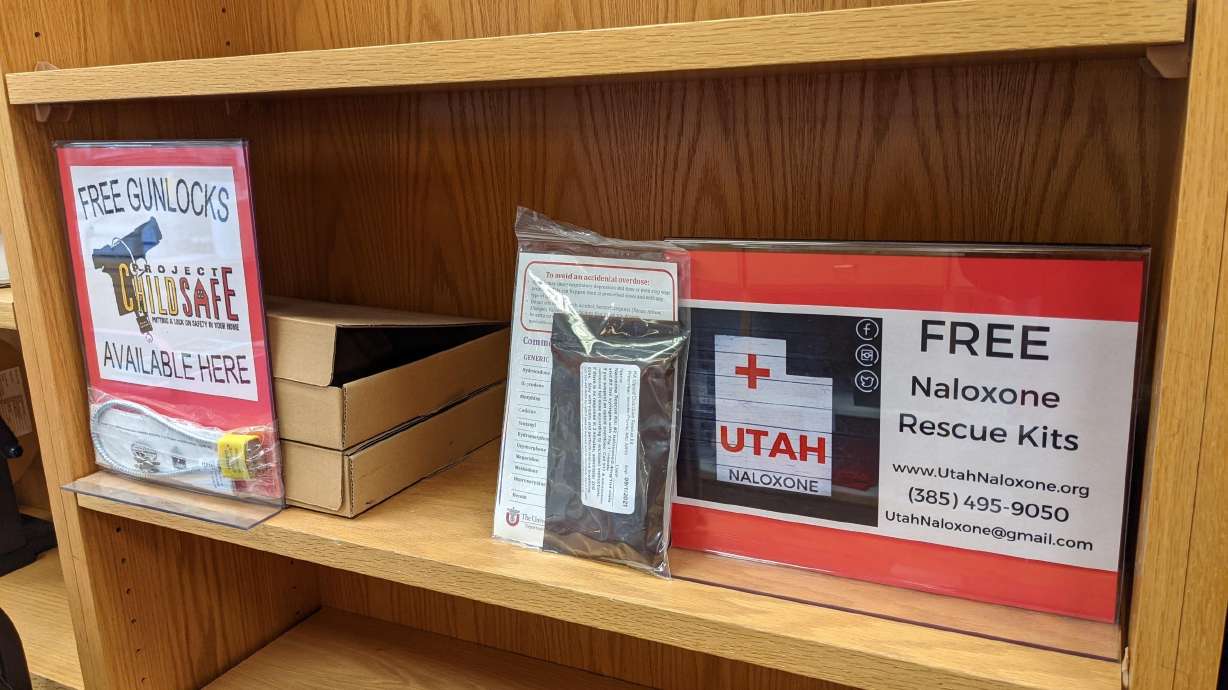Estimated read time: 4-5 minutes
This archived news story is available only for your personal, non-commercial use. Information in the story may be outdated or superseded by additional information. Reading or replaying the story in its archived form does not constitute a republication of the story.
SPANISH FORK — When walking into a library, there are things to expect: books, computers and other informative media ready to be used to enlighten the minds of community members who seek it.
In recent years, however, libraries have been a resource for other things that not only enrich lives but save them. Lifesaving items like gun locks and naloxone kits, which are used to offset an opioid overdose, have been making their way to the checkout counters at a growing number of libraries across the state. And according to Utah County Health Department Injury Prevention Coordinator Marla Brannum, the library is the perfect place to have these resources available.
"The library is a nonthreatening place for most people," Brannum said. "Gun locks and naloxone kits are available at police stations, but those can often be triggering places for people. Individuals in need of these things might also be afraid that they will be asked for their information. Libraries offer a safe place for people to get these items with no questions asked."
Spanish Fork resident Susan Chapman knows firsthand the importance of these things as both a community advocate working with the city and one who nearly lost a family member to an opioid overdose.
"I have a family member who almost died from an overdose, and it was this experience that has driven me to make things like gun locks and naloxone available to the people who need them," Chapman said. "Having these resources in libraries really does offer a safe place for people who need them, especially because the families who seek out these kits don't want to be seen, known or tracked down. They really just want to help a family member or friend in need."
Chapman went on to cite data from the Social and Behavioral Health During COVID-19 report, released by the Utah Department of Health and the Utah Suicide Prevention Coalition in October, naming Utah as one of the few states that didn't experience an increase in suicide and drug-related deaths during the pandemic.
Although Chapman and those who spoke about the report with KSL.com last month all agreed that the death rate is still far too high, the fact that there was no increase in deaths shows that many of the preventative systems put in place may very well be a reason why.
Related:
"There has been a lot of foresight that has gone into these programs," Chapman said. "A lot of these systems and programs like having gun locks and naloxone kits in libraries were all lined up and running before the pandemic, which is really what, I believe, helped keep these numbers from growing."
Brannum agreed, adding that not only was foresight a big factor in implementing these programs, but the programs also allow these individuals who don't have foresight the time to think — and hopefully live.
"What many people don't know is that most gun-related deaths are suicides," Brannum said. "Having a gun lock gives the individual who is wanting to end his or her life those lifesaving minutes to think about their decision. Suicide is the most preventable form of death because if you can get people the help they need, they can continue to live — and many go on to live good and very fulfilling lives. It's not that they want to die; it's that they want the pain to stop."
Spanish Fork Library Director Scott Aylett has had gun locks at his library for a couple of years, and naloxone kits have been available there for the past six months. He said he has distributed 28 naloxone kits since having them, and he sees libraries as the perfect place to have these resources because of the nature of libraries.
"Libraries have always been places for learning and have been seen as safe places for those in the community, so it makes sense that we have these things here," Aylett said. "Along with the kits, we have offered classes on suicide prevention and opioid overdose to educate the public.
"Libraries aren't like they were years ago, where you came in quietly to check out a book. Now we have classes and events to facilitate learning. As I see it, a library is the community living room where we facilitate community coming together; it is a safe place to have tough conversations and learn from one another. People feel safe coming to the library, and I want to continue to make the Spanish Fork Library a safe place for all who come — especially those who need help."
These potentially lifesaving items are available in most libraries in Salt Lake and Utah counties, and those in need are encouraged to contact their local libraries individually to check the availability of resources.
Community resources
Learn more about naloxone, used as an antidote to overdose, at http://www.utahnaloxone.org/.
Find out where to dispose of prescription medications at https://knowyourscript.org/.
Access to the full Utah Suicide Prevention State Plan, including steps and information about how to support someone in crisis, can be found online, at https://liveonutah.org/about.
Suicide Prevention Resources
If you or someone you know is struggling with thoughts of suicide, call the suicide prevention hotline at 1-800-273-TALK.
Crisis Hotlines
- Utah County Crisis Line: 801-691-5433
- Salt Lake County/UNI Crisis Line: 801-587-3000
- Wasatch Mental Health Crisis Line: 801-373-7393
- National Suicide Prevention Lifeline: 1-800-273-TALK (8255)
- Trevor Project Hotline for LGBTQ teens: 1-866-488-7386
Online resources
- NAMI Utah: namiut.org
- Utah Chapter-American Foundation for Suicide Prevention: afsputah.com
- Suicide Prevention Lifeline: www.suicidepreventionlifeline.org











